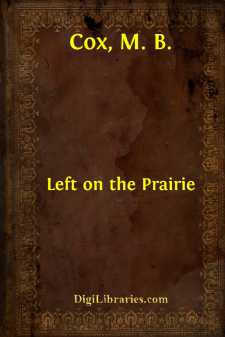Categories
- Antiques & Collectibles 13
- Architecture 36
- Art 48
- Bibles 22
- Biography & Autobiography 813
- Body, Mind & Spirit 142
- Business & Economics 28
- Children's Books 15
- Children's Fiction 12
- Computers 4
- Cooking 94
- Crafts & Hobbies 4
- Drama 346
- Education 46
- Family & Relationships 57
- Fiction 11828
- Games 19
- Gardening 17
- Health & Fitness 34
- History 1377
- House & Home 1
- Humor 147
- Juvenile Fiction 1873
- Juvenile Nonfiction 202
- Language Arts & Disciplines 88
- Law 16
- Literary Collections 686
- Literary Criticism 179
- Mathematics 13
- Medical 41
- Music 40
- Nature 179
- Non-Classifiable 1768
- Performing Arts 7
- Periodicals 1453
- Philosophy 64
- Photography 2
- Poetry 896
- Political Science 203
- Psychology 42
- Reference 154
- Religion 513
- Science 126
- Self-Help 84
- Social Science 81
- Sports & Recreation 34
- Study Aids 3
- Technology & Engineering 59
- Transportation 23
- Travel 463
- True Crime 29
Left on the Prairie
by: M. B. Cox
Description:
Excerpt
CHAPTER I.
AT LONGVIEW.
Little Jack Wilson had been born in England; but when he was quite a baby his parents had sailed across the sea, taking him with them, and settled out on one of the distant prairies of America. Of course, Jack was too small when he left to remember anything of England himself, but as he grew older he liked to hear his father and mother talk about the old country where he and they had been born, and to which they still seemed to cling with great affection. Sometimes, as they looked out-of-doors over the burnt-up prairie round their new home, his father would tell him about the trim green fields they had left so far behind them, and say with a sigh, 'Old England was like a garden, but this place is nothing but a wilderness!'
Longview was the name of the lonely western village where George Wilson, his wife, and Jack had lived for eight years, and although we should not have thought it a particularly nice place, they were very happy there. Longview was half-way between two large mining towns, sixty miles apart, and as there was no railway in those parts, the people going to and from the different mines were obliged to travel by waggons, and often halted for a night at Longview to break the journey.
It was a very hot and dusty village in summer, as there were no nice trees to give pleasant shade from the sun, and the staring rows of wooden houses that formed the streets had no gardens in front to make them look pretty. In winter it was almost worse, for the cold winds came sweeping down from the distant mountains and rushed shrieking across the plains towards the unprotected village. They whirled the snow into clouds, making big drifts, and whistled round the frame houses as if threatening to blow them right away.
Jack was used to it, however, and, in spite of the heat and cold, was a happy little lad. His parents had come to America, in the first place, because times were so bad in England, and secondly, because Mrs. Wilson's only sister had emigrated many years before them to Longview, and had been so anxious to have her relations near her.
Aunt Sue, as Jack called her, had married very young, and accompanied her husband, Mat Byrne, to the West. He was a miner, and when he worked got good wages; but he was an idle, thriftless fellow, who soon got into disfavour with his employers, and a year or two after the Wilsons came he took to drink, and made sad trouble for his wife and his three boys. George Wilson had expostulated with him often, and begged him to be more steady, but Mat was jealous of his honest brother-in-law, who worked so hard and was fairly comfortable, and therefore he resented the kind words of advice, and George was obliged to leave him alone.
George Wilson made his living by freighting—that is, carrying goods from place to place by waggons, as there was no rail by which to send things. Sometimes, when he took extra long journeys, he would have to leave his wife and boy for some weeks to keep each other company.
'Take care of your mother, Jack, my boy,' he would say, before starting....


